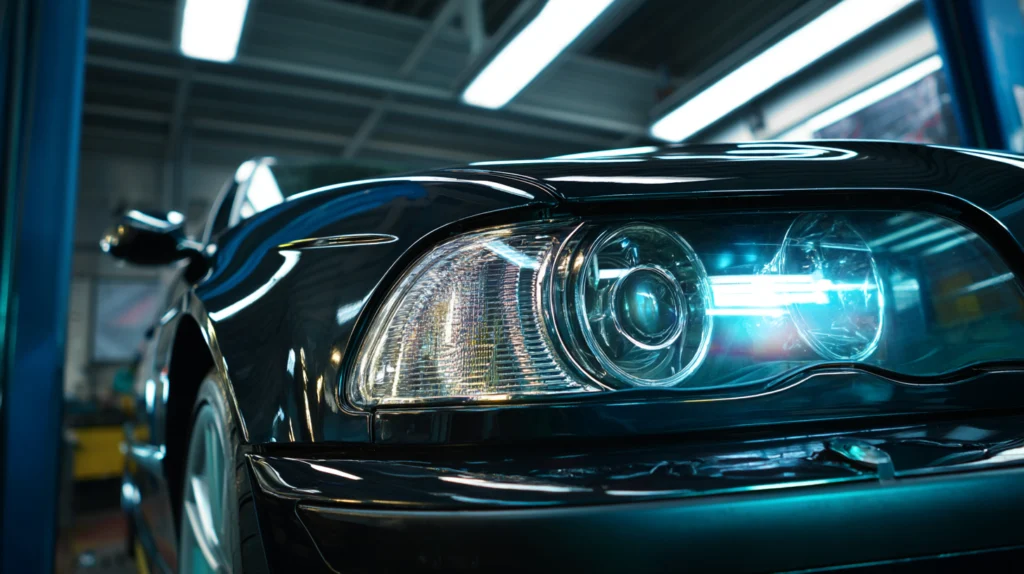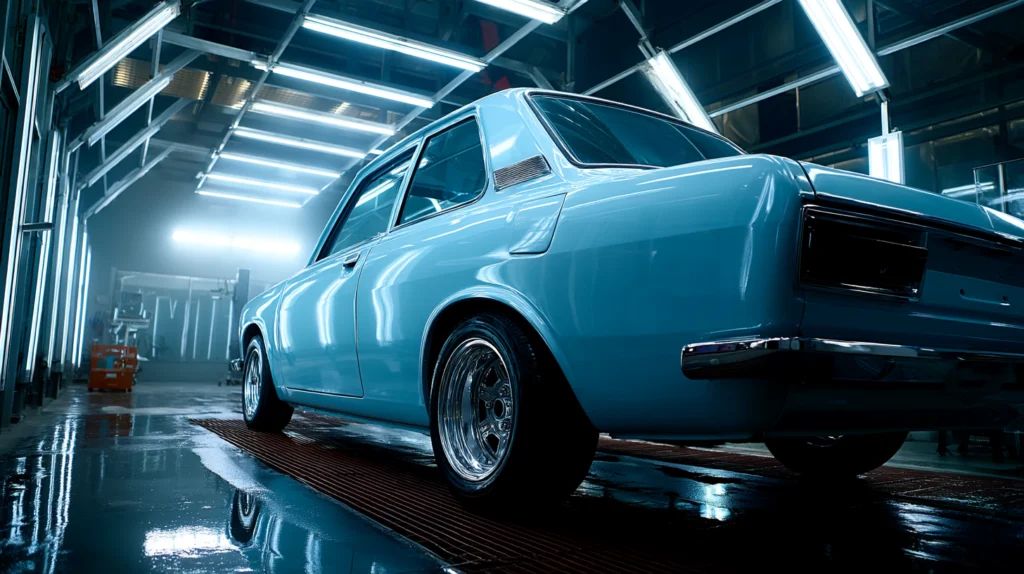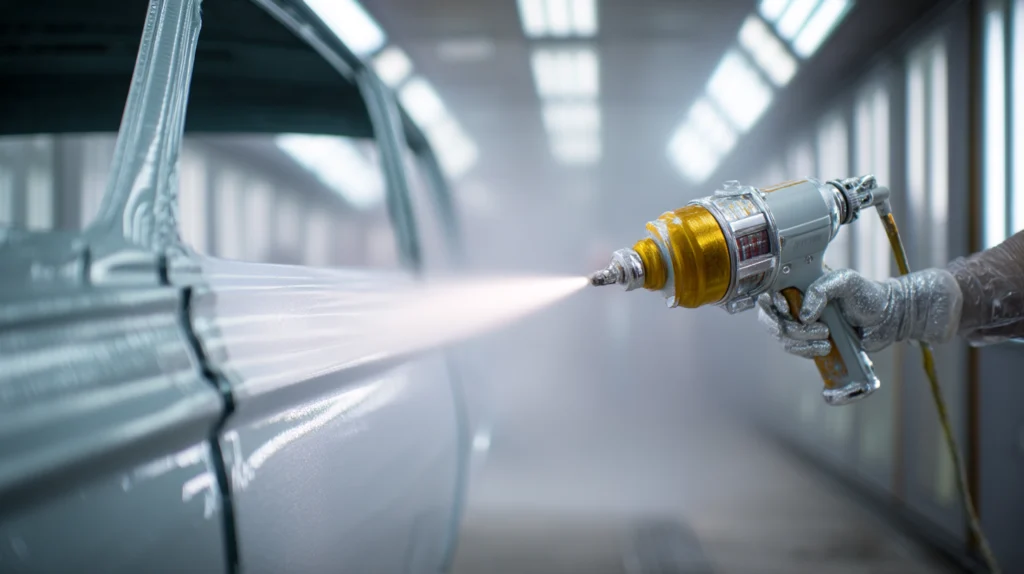A Complete Guide for Vehicle Owners
Car paint is more than a cosmetic finish, it plays a major role in protecting your vehicle’s exterior from rust, environmental damage, and everyday wear. Many drivers want to know how long should car paint last, especially in regions with strong sun exposure or frequent weather exposure. As part of the Re Lux Collision team, we work with modern automotive paints every day. Our experience gives us a clear view of what makes a car’s paint job last, what causes peeling paint, and how proper care and consistent maintenance can extend paint longevity. This guide follows the same structure as before but now incorporates all required keywords, keeps the tone aligned with our brand, and removes all links. Everything is written with the same clarity and professionalism our customers expect.
What Determines How Long Car Paint Lasts?
Understanding the Modern Automotive Paint System
Modern automotive paints are engineered to protect vehicles while creating a smooth, glossy finish. A car’s paint job typically includes primer, a color coat known as the base coat, a color coat layer, and a clear coat that serves as the protective layer. The clear coat is the part most responsible for long term durability because it shields the paint surface from uv rays, uv radiation, acid rain, harsh chemicals, bird droppings, tree sap, road salt, and other damaging elements. Factory paint is applied using precise techniques and controlled paint application processes. This whole process includes several coats of primer, base coat, and clear coat that bond together under specialized equipment. Refinish work from a body shop uses similar steps but relies heavily on technician skill, high quality paint materials, and the right environment to achieve longevity.
Typical Lifespan Expectations
Most vehicles roll off the factory line with finishes designed to last. For people wondering how long should car paint last, the general expectations are clear. OEM finishes can last 10 to 15 years with proper care, while a professional repaint or new paint job usually lasts around 5 to 10 years. These ranges shift based on how often you wash your car regularly, how you protect the vehicle’s exterior, and how much sun exposure or weather exposure the paint receives. A high quality paint job with good maintenance habits can outlast these averages by several years.
Factors That Shorten or Extend the Life of Your Paint

Sun Exposure and UV Damage
Direct sunlight is one of the quickest ways to age a car’s paint. Prolonged exposure to uv rays weakens clear coat layers, leading to dullness, oxidation, and peeling paint. Sacramento and other sunny regions see faster fading because uv damage happens year round. A car cover, shaded parking, or storing the car in a garage can help protect the surface and slow down early deterioration.
Weather, Road Conditions and Environmental Contaminants
Harsh conditions accelerate wear on a car’s paint. Tree sap, bird droppings, acid rain, dirt, small chips from debris, and even road salts can affect the protective layer and cause environmental damage. Bird droppings and tree sap contain acidic compounds that etch deeply into the clear coat after only a few hours. Dirt and chemical contaminants can scratch the paint surface when wiped improperly. Even touching the surface with abrasive sponges instead of a microfiber towel will create scratches over time. Vehicles exposed to highways or construction zones often show more small chips and fading because of constant debris impact.
Quality of the Paint Job
The quality of a paint job determines how long it stays vibrant. High quality paint, proper prep work, clean spray areas, and effective painting techniques all make a difference. A rushed repaint or poor paint application creates weak bonding that leads to peeling paint, hidden damage, and reduced durability. A body shop with trained technicians understands how to apply several coats correctly, maintain the right temperatures, and protect the paint during curing. High quality paint products also enhance gloss and help make the paint last longer. When the right materials and techniques are used, the vehicle’s paint can withstand damaging elements much more effectively.
Maintenance and Washing Habits
Caring for the vehicle’s paint is essential. Regular washing removes dirt, chemical contaminants, and organic residue before they cause further damage. Washing your car regularly with gentle products helps keep the protective layer intact. It is important to wash using a microfiber towel instead of abrasive sponges to avoid scratches. Waxing the car every few months adds an extra layer of protection, maintaining the paint’s shine and giving the clear coat more resistance against harsh chemicals, uv radiation, and prolonged exposure to the elements. Owners who apply a good wax or use protective coatings typically see much better paint longevity.
Protective Coatings and Films
Ceramic coating is one of the most effective ways to protect a car’s paint. A ceramic coating forms a durable protective barrier over the clear coat that shields the paint from bird droppings, tree sap, dirt, and chemical contaminants. It also helps maintain the paint’s shine by resisting oxidation. Paint protection films and other protective coatings can prevent scratches, protect against small chips, and keep the surface smooth. While these additions do not replace proper care, they greatly extend the life of the paint.
How Storage and Driving Habits Influence Longevity
Where you park and how you drive have a major impact on how long a paint job lasts. A car parked outdoors full time experiences far more uv rays, uv damage, and weather exposure. Cars kept in a garage or under a car cover stay cooler and cleaner, reducing fading and oxidation. Vehicles driven long distances or in harsh conditions such as gravel roads, industrial areas, or salted highways often experience more scratches and small chips. Parking lot hazards also add risk. With proper care and consistent maintenance, however, these impacts can be minimized.
How Long Should Factory Paint Really Last?

The 10 to 15 Year Expectation Window
Most manufacturers design automotive paints to last around 10 to 15 years before major wear appears. While some fading is normal over time, the clear coat should remain intact for many years under ideal conditions. In sunny climates, the paint may age faster unless the vehicle receives regular washing, waxing, and protective coatings. The answer to how long should car paint last depends heavily on maintenance, storage habits, and the type of driving you do.
Signs Your Factory Paint Is Wearing Out
Common signs that the vehicle’s paint is aging include dull areas, rough surface texture, oxidation, peeling paint, faded color, and cloudy patches. Once the clear coat begins to fail, the underlying color coat becomes exposed to water, rust, dirt, and sunlight, which accelerates further damage. When factory finishes reach this stage, the only long term solution is repainting.
How Long Should a Body Shop Repaint Last?
When a Repaint Should Last 5 to 10 Years
A professional repaint or new paint job should last 5 to 10 years when high quality paint is used. Proper care during curing and afterward is important, because new paint is more sensitive during the first few weeks. High quality materials, experienced technicians, and a clean environment all contribute to a more durable result. With proper care, even a new paint job can rival factory finishes.
What Can Make a Repaint Fail Early?
Early failure often comes from poor preparation, incorrect paint application, or contamination. If the shop does not maintain the right temperature or uses lower quality materials, the paint may crack or peel within a few years. Customer habits also matter. Washing too soon, using harsh chemicals, or exposing new paint to intense direct sunlight can compromise the protective layer and reduce the lifespan of the repaint.
How to Make Your Car’s Paint Last as Long as Possible

Follow a Consistent Washing Routine
Regular washing is the foundation of paint longevity. Gentle products are key. Avoid abrasive sponges and always rinse dirt before wiping. Using a microfiber towel protects the surface and reduces micro scratches. Washing every two weeks is ideal for most vehicles.
Waxing, Sealants and Ceramic Coatings
Waxing adds an extra layer of protection that preserves shine and helps the clear coat resist intrusion from chemical contaminants or environmental damage. Ceramic coating provides stronger protection and is extremely effective at preserving new paint. These products help keep the paint surface smooth and maintain the paint’s shine longer.
Protecting Paint After Repairs
Fresh paint requires careful handling. During the first few hours after painting, the surface is extremely sensitive. For the next 60 to 90 days, avoid harsh chemicals, pressure washing, or automatic washes. A gentle hand wash is the safest option. Following these maintenance tips ensures the paint cures evenly and maintains strength.
Smart Storage and Daily Habits
Simple habits like using a car cover, parking in the shade, or using a garage help protect the vehicle’s exterior. Avoid parking under trees where bird droppings or tree sap may fall. Protecting your car daily will improve overall paint longevity.
When It’s Time to Repaint or Repair Your Car’s Paint
Signs You Need Professional Attention
You may need repair services when you see peeling paint, severe scratches, oxidation, rust, or mismatched painted panels. Buffing or touch ups may fix minor imperfections, but widespread damage often requires a new paint job.
Repaint vs Spot Repair vs Buffing
Buffing removes minor scratches. Spot repair handles localized issues like small chips. A full panel repaint is required when damage affects large areas. A technician can inspect for hidden damage and recommend the right service.
Why Paint Quality Matters in Collision Repair

The Importance of Certified Technicians
Certified technicians understand how automotive paints bond to surfaces. They know how to prepare panels, apply several coats evenly, and produce long lasting results. Their work helps ensure your paint lasts as long as possible.
The Value of a Quality Warranty
A strong workmanship warranty shows confidence in materials, paint application, and overall quality. It gives customers peace of mind that the paint job will perform as expected.
Frequently Asked Questions
Does car paint fade faster in California?
Yes, stronger uv rays and direct sunlight accelerate fading.
How long does clear coat last before it fails?
Clear coat typically lasts 5 to 15 years.
How do I know if my clear coat is damaged?
You may see dullness, peeling paint, or rough patches.
How long does paint last after a collision repair?
A high quality new paint job lasts 5 to 10 years with proper care.
Can ceramic coating make my paint last longer?
Yes, it forms a protective barrier that reduces uv damage and staining.
Is it worth repainting an older car?
Yes when restoring appearance, preventing rust, or protecting the vehicle.
How long should I wait to wash a freshly painted car?
Wait several weeks and avoid wax until the paint fully cures.
Why does red paint fade faster than other colors?
Red pigments absorb more uv radiation which increases fading.
How do I protect my paint if I park outside all the time?
Use a car cover, wash regularly, wax often, and consider ceramic coating.
Final Thoughts, Getting the Most Life Out of Your Paint
Car paint plays a major role in protecting your vehicle. With proper care and high quality refinishing, your paint can stay vibrant for many years. Harsh conditions will always affect durability, but regular washing, good wax applications, protective coatings, and smart storage habits keep the vehicle looking great. When your paint needs attention, our team delivers precise, professional results. Get your free estimate today, schedule your visit, or contact our team for expert help.




